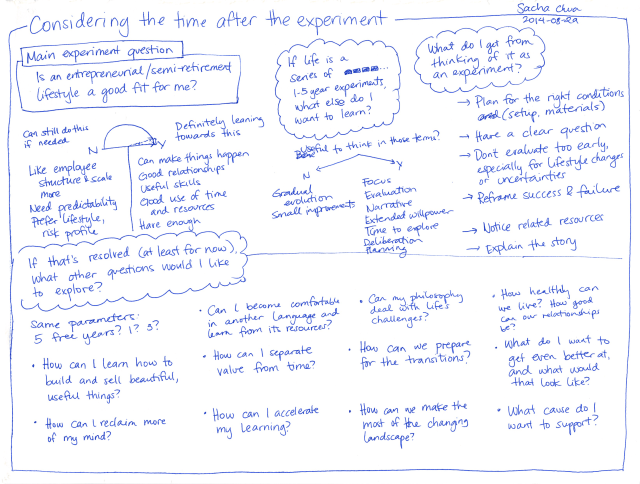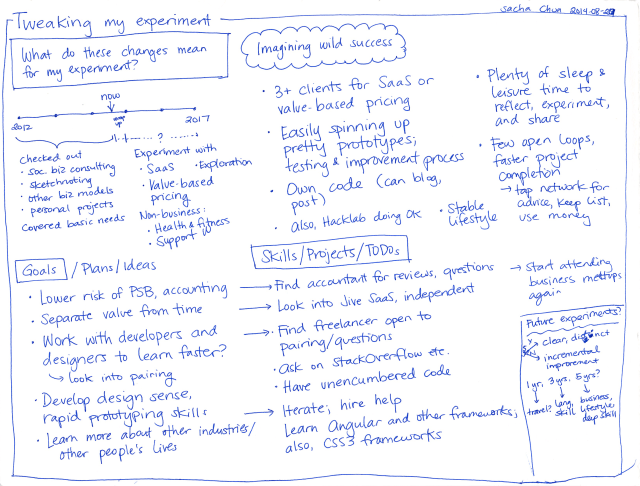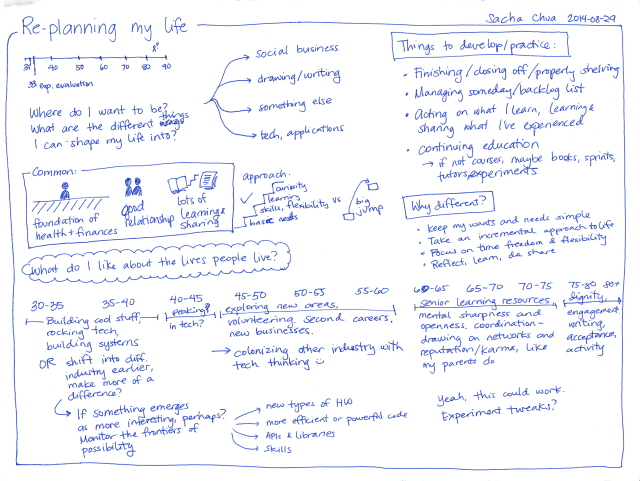Planning ahead for experiments
Posted: - Modified: | experimentExperimenting doesn't have to be about coming up with conclusive answers. It can be about reducing uncertainty and increasing understanding. For example, compared to where I was at the beginning of this 5-year experiment with semi-retirement, I'm more comfortable with business. There are fewer unknowns in my life. No, actually–there are just as many unknowns, I think, but I feel more confident about handling them.
The original questions for this 5-year experiment were along these lines:
- Would I be able to build a viable business that fit my goals and needs?
- Would this kind of lifestyle be a good fit for me (and by extension, for us)?
- Would I use the additional time well?
If life continues along its current path, I'm reasonably certain that the answers will be yes, yes, and yes. So I've been thinking: what other uncertainties do I want to explore? What other unknowns do I want to learn more about? Does it make sense to structure those as experiments as well?
Thinking of these things as experiments seems to work well for me. Not the high school sort of experiment where we dutifully rolled marbles down inclines or mixed various chemicals to note their reactions, but rather a time-bound trial that you prepare for, observe, learn from, and reflect on. Before I started framing things as experiments, I usually limited myself to small ideas and occasional improvements. Thinking of this as an experiment helps me say to myself, yes, it will take a bit of time to really unfold, so don't worry about evaluating it too early, and don't worry too much about messing up because you'll learn something along the way.
Anyway… What other experiments might I run after this? Are there experiments that would make sense in parallel? I'm somewhat curious about trying out different business models to see what they're like. I'm curious about building an even more solid foundation for future experiments in terms of health, skills, and other intangibles. I'm curious about learning and adapting to a changing world. I don't have a clear experiment yet, not like the way I delineated my current experiment, but I'm sure that will come to me.
In the meantime, I have two years left in this experiment. Having the basics covered means that I can try bigger and more interesting things. Maybe software as a service? I've been avoiding this because of the risks and the support commitments, but maybe it's time to learn more about building products and services that people might find useful. I know where to find the markets for some of the ideas I'm interested in, and I know some people who'd be willing to give me feedback and help me build things for them and others. There are a number of other non-business things I want to learn more about, too.
I like looking at other people's lives in order to pick up ideas for things to try in mine. It's useful to look at the life paths for both typical people and exceptional people, since all those paths sketch out different possibilities. If I can imagine myself clearly at different ages and on different probable paths, I can get a better sense of what I want to do in the near future. It's a little like bringing those possible future Sachas together so that I can ask them how they got to where they are, and maybe adjust my current path a little. It's a strange mental image, I guess, but it's handy for me. And there are tons of other people to learn from, too–role models from so many different walks of life.
Hmm. Let's see how things work out…




1 comment
akamaozu
2014-09-15T12:21:25ZGreat read! I always run experiments in business, so it's nice to read about other people's experiments. Thanks for sharing!